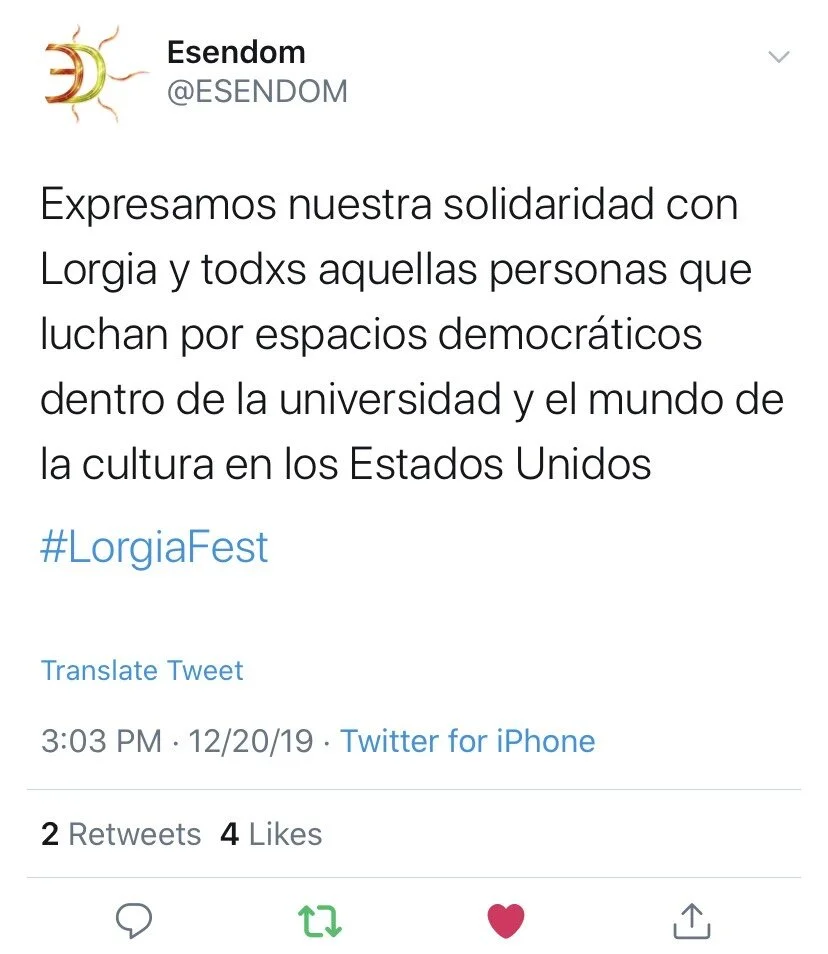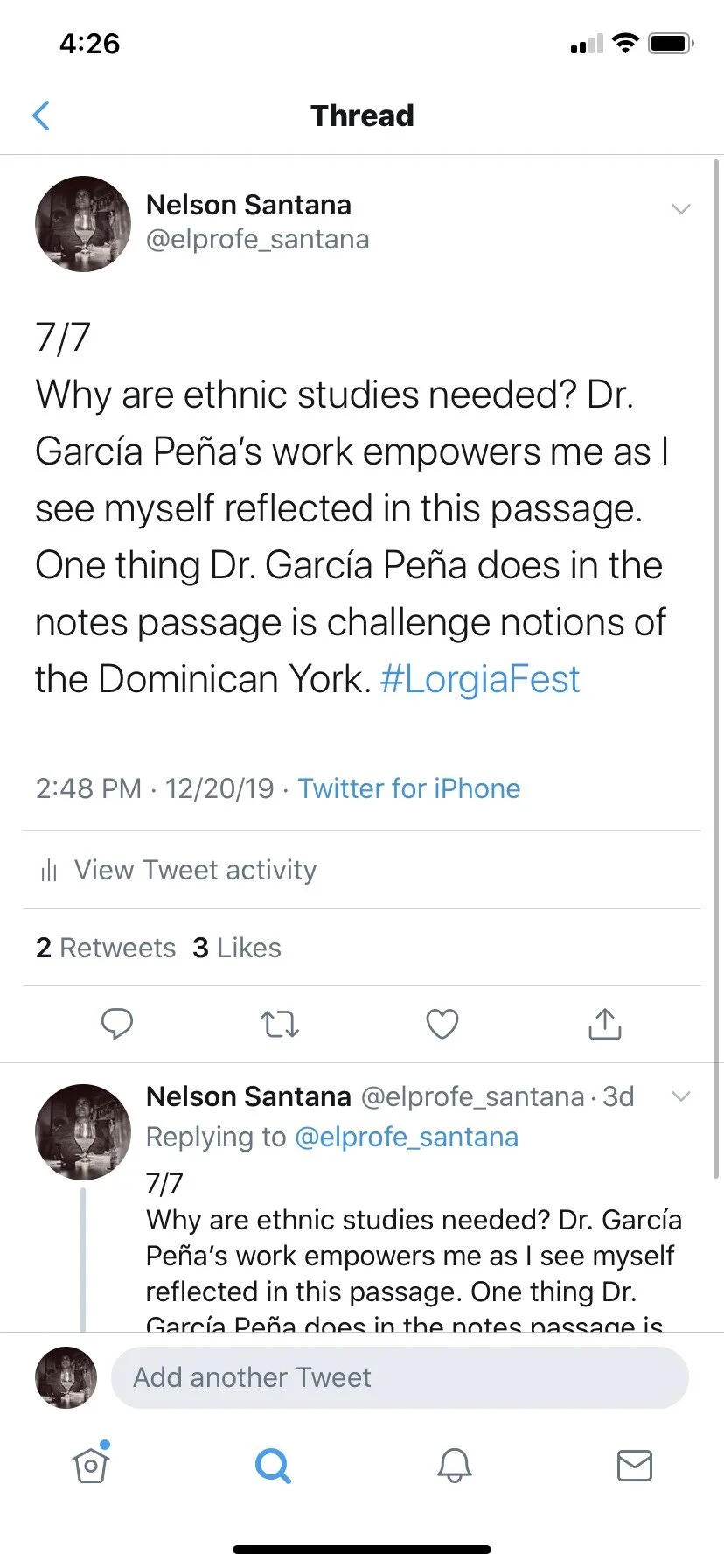By Nelson Santana
December 24, 2019
This past Friday, December 20, an unprecedented event took place via Twitter as hundreds of scholars, activists, and avid readers participated in #LorgiaFest, a celebration of Dr. Lorgia García Peña’s scholarship as well as an effort to create awareness about the need for ethnic studies. A tweet by Alex Gil encapsulated the mood during #LorgiaFest: “Reading all of you coming together like this is very moving.”
How We Got Here
Prior to this massive mobilization effort, Harvard University denied tenure to one of its brightest star academics: Lorgia García Peña. Almost immediately, students and scholars launched a petition response making four demands that included asking for more transparency during Harvard’s tenure process and also requesting the formal establishment of an Ethnic Studies Department at the university. A week later, a letter of protest signed by 200 scholars in support of García Peña circulated. ESENDOM has provided coverage on this developing story since the news came to light in early December.
Ethnic Studies Rise: Response from Scholars and Students
García Peña’s tenure denial served as the catalyst for #LorgiaFest, which simultaneously started a conversation about the need for ethnic studies. In addition, the events that transpired at Harvard University also led to the creation of “Ethnic Studies Rise.” According to its website:
“Ethnic Studies Rise is quickly becoming an important intellectual space for scholarly engagement.”
“Ethnic Studies Rise” is a public humanities effort to honor the extraordinary contributions of scholar Dr. Lorgia García Peña, the Roy G. Clouse Associate Professor of Romance Languages at Harvard University. It is a platform to promote wide public engagement with her work, and, more broadly, with Ethnic Studies and associated areas of study.”
Conceived as an idea by Katerina González Seligmann (Emerson College) alongside Raj Chetty (San Diego State University), in collaboration with Alex Gil (Columbia University), “Ethnic Studies Rise” is quickly becoming an important intellectual space for scholarly engagement. The backdrop to this fight for representation is the ascendancy of a conservative president who attacks education and science by underfunding it.
Roundtable Discussions
A critical component of “Ethnic Studies Rise” are the roundtable discussions. Thus far, established and up-and-coming scholars have engaged one another in the engaging roundtable dialogues.
As of this writing, three roundtable discussions have been published:
ETHNIC STUDIES NOW FRANCES NEGRÓN-MUNTANER AND ROOPIKA RISAM (December 19, 2019)
“In this strong exchange, Frances Negrón-Muntaner (Columbia U.) and Roopika Risam (Salem State U.) discuss why Ethnic Studies now. Negrón-Muntaner discusses how universities approach Ethnic Studies as a threat precisely because Ethnic Studies seeks to overturn the status quo as an “insurrection” from within and without. Roopika Risam continues in the same vein by outlining the imbrication of the university and racial capitalism and declaring the university as we know it “indefensible.”
A BLACK RADICAL TRADITION WITHOUT BORDERS ROBIN KELLEY AND LAURENT DUBOIS (December 18)
“In this powerful epistolary exchange, Robin D. G. Kelley (UCLA) and Laurent Dubois (Duke U.) respond to a set of guiding questions about the importance of thinking, theorizing, and historicizing race and racial blackness globally, internationally, and transnationally.“
TRAVERSING THE BORDERS OF DOMINICANIDAD JOSSIANNA ARROYO, SHARINA MAILLO-POZO, AND DANNY MENDEZ (December 18, 2019)
“In this exchange, Jossianna Arroyo (U. of Texas, Austin), Sharina Maillo-Pozo (U. of Georgia), and Danny Méndez (Michigan State U.) delve into The Borders of Dominicanidad. Arroyo and Maillo-Pozo offer cogent analyses of the book’s wide-ranging contributions, and Méndez offers a moving response to their analyses that considers the book in relation to García Peña’s commitments.”
#LorgiaFest 2019
In organizing #LorgiaFest, Katerina González Seligmann and Raj Chetty, in collaboration with Alex Gil, asked users to participate in the Twitter event by inviting readers to tweet meaningful passages—using the hashtag #LorgiaFest—from García Peña’s award-winning book, The Borders of Dominicanidad: Race, Nation, and Archives of Contradiction (Duke University Press, 2016). Duke University Press provided readers with a 30% discount for the print version, while simultaneously making the book available for free via downloadable PDF.
The Borders of Dominicanidad is the recipient of multiple awards including the 2017 National Women’s Studies Association Gloria E. Anzaldúa Book Prize, the 2016 LASA Latino/a Studies Book Award, and the 2016 Isis Duarte Book Prize in Haiti and Dominican Studies.
Different methods will be implemented to measure the success of #LorgiaFest. Nonetheless, one indicative measure, one may argue, comes in the form of The Borders of Dominicanidad. According to Duke University Press’ official Twitter account, the publisher ran out of books due to high demand. Several users weighed in on the matter:
#LorgiaFest brought together a diverse group of people. Renowned artist and writer, Josefina Báez, made several posts. In one of her tweets, Báez wrote, “#lorgiafest I must express my joy, honor and gratefulness to Prof. Garcia-Peña dialogue with my work. Her take on it, extend its meaning (s) and intertwines it with every possibility. In the process, I learn heaps about it. Co-creating communal thought.” García Peña has played a pivotal role in bringing awareness to Báez’s work as a writer and artist; for instance, Báez has performed at Harvard University courtesy of Garcia Peña.
Rutgers University Professor Omaris Z. Zamora noted how García Peña’s work on the bodies of Black Dominican women as sites of memory and embodied archives heavily influenced her own journey while writing her dissertation, which she is now reworking as a book. According to Zamora, “Before BoD was published, I cited @lorgia_pena in what was then my dissertation and what is morphing now into my first book project. Ideas of thinking of black Dominican women’s bodies as sites of memory and embodied archives was influenced by her work then and now #lorgiafest.”
Members of ESENDOM’s editorial team posted several tweets, including the following message: “The campaign on behalf of Lorgia resembles the battles of the 1960s over inclusion in academia and other spheres of political and social life.”
García Peña acknowledged the support she received from people who participated in #LorgiaFest by engaging them on social media through tweets, reposts, and liking posts.
#LorgiaFest was moderated by Chetty and González Seligmann. You can view more tweets below.
Tweets:
































